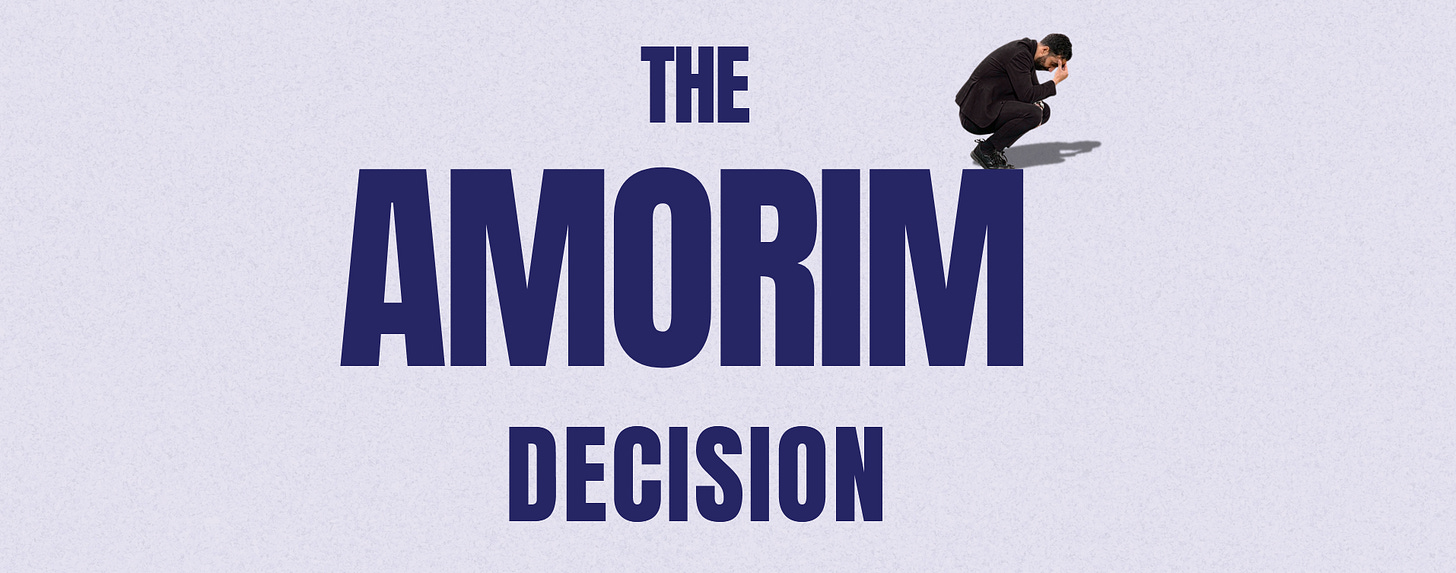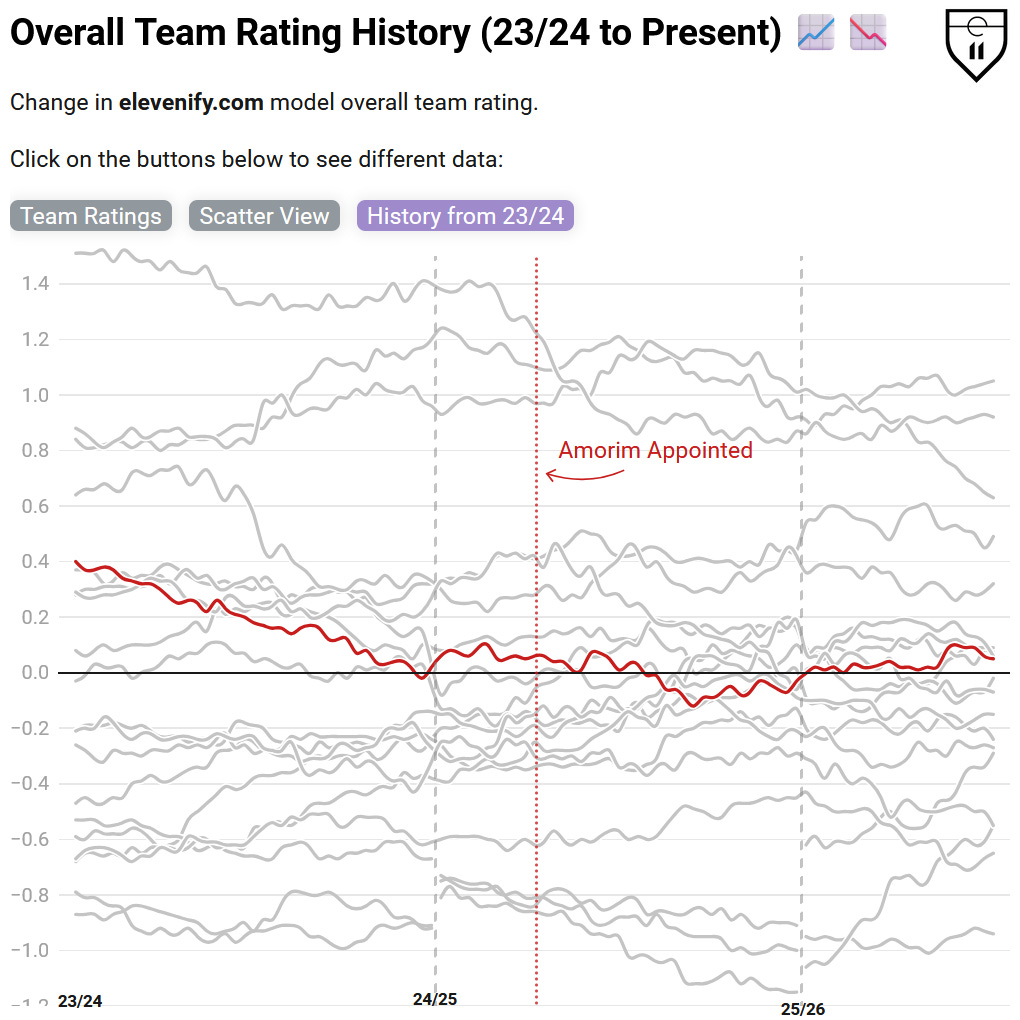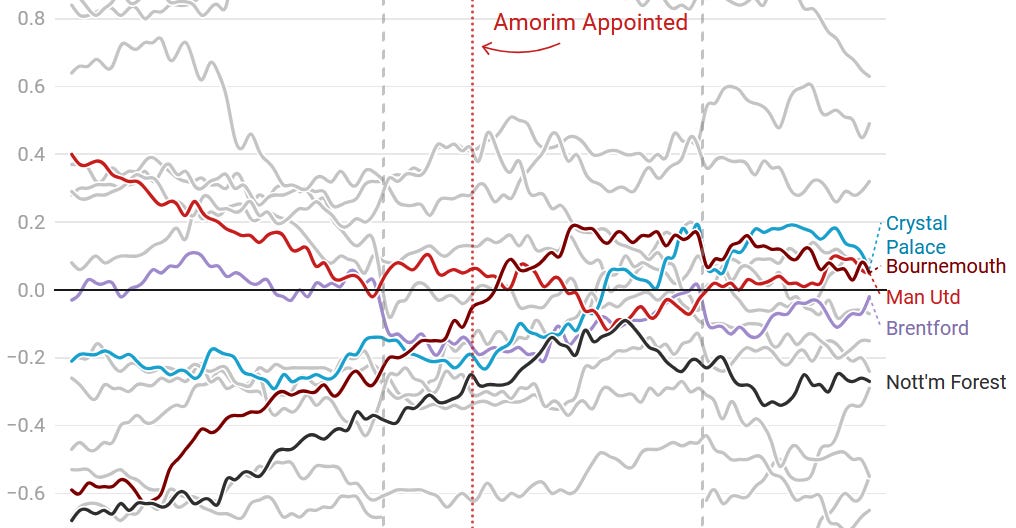25/26 #05: The Amorim Decision.
What should Man United do with Ruben Amorim?
5 January 2026 Update: Rúben Amorim has been sacked by Manchester United. This article was written in early September. I have updated the model screenshots below with the ratings as of today. No other changes have been made.
The phrase “give the manager time” is firmly entrenched in football psyche. This is partly justified because deciding whether to sack a manager is difficult: the kind of poor performance that leads to dismissal considerations usually results from a mix of bad luck and bad coaching.
The saying also touches on the widely-held belief that the feedback loop on a managerial decision won’t be clear for a long time, so we should abstain and give managers time. I don’t think that belief helps us understand things. You should never believe a feedback loop is so long that you can learn nothing from it.
You don’t hire a manager and then receive no new information for years. We’ve had a steady stream of information throughout Amorim’s tenure. We can grade and evaluate Amorim’s appointment now (even if it is true that more will become clear in the future). That is what matters and what decisions should be based on… and every moment you choose to keep the status quo, e.g. retain a manager, you are making an active decision, even if it feels like passively doing nothing.
United Under Amorim
As a reminder, my model uses raw performance data to generate estimates of team strength. These strengths are updated after each match based on how wrong its predictions were, taking into account match performance and the strength of the opponent. In my view, this is the best way to separate bad play from bad luck. There is no other metric or trend that better calibrates beliefs based on the strength of the evidence.1
Two things can be true about United & Amorim:
United are an actual and deserved mid-table side. Fixing that in Amorim's short tenure is ~impossible.
Equally, there is little evidence that United have improved under Amorim.
Some may argue that playstyle is an alternative explanation for the lack of improved results, that the system will suddenly “click”, and results will turn around rapidly. I think this is unlikely2 and does not change the reality that Manchester United are no more likely to win a Premier League match today than when Amorim was appointed.
Decision Landscape
So things are bad, most would agree with that. How do INEOS decide whether to sack Amorim or give him more time?
It’s helpful to start with a ‘base rate’ for our expectations: what data points do we have that help us understand what usually happens in a situation like this?
We shouldn’t limit ourselves to just Amorim’s data when forming our prior expectations. When the question is whether Amorim has shown enough evidence during his tenure to be considered a Premier League-level manager, we also have data from 20+ other Premier League managers in the same period. My model has made nearly 1,000 predictions and received outcomes for all of those data points. That is a lot of information we can use to make decisions and help us address the long feedback loop problem.
These data points suggest that when a team hasn’t improved (at all) within the time Amorim has been given, it is unlikely to improve later.3 I think there are some fair ‘reference cases’: Nuno quickly improved Nottingham Forest, Iraola steadily improved Bournemouth, Glasner revamped Crystal Palace, and Thomas Frank consistently improved Brentford. 4 Slot even won the league in his first season with essentially the same squad. 5
Recommendations
Primary Recommendation:
I think INEOS should dismiss Amorim now. I feel comfortable enough to predict Manchester United are not going to substantially improve under Amorim any time soon,6 nor do I see the long-term vision.
Good decision process is walking away when you ought to, not when you want to.
INEOS have invested heavily in this project. There are many signals that they should stop, but they may view Amorim as “their guy.” It was their first major decision, and now that they’ve committed to him, it may be hard to sack him. Classic sunk-cost fallacy.
The project is well underway, and there is now ample evidence that it isn’t working. Rather than focusing on the resources and reputation already invested in Amorim and the squad, it’s better to view each new investment in the project as further waste. Wasted investments are not just retrospective; they also impact future planning. Manchester United are already dealing with this issue, carrying a squad built by multiple managers with different tactical ideas.
Which, in itself, is an added benefit of sacking Amorim quickly. Manchester United actually have a fairly decent squad, and one thing most of the players have in common is (ironically?) that they don’t really know how to play well in Amorim’s system. Players are ultimately more important than the manager when it comes to on-field performance, so there’s a strong case to be made that the quickest and most reliable way for United to become a better team is by replacing Amorim with a manager who can better utilise the current squad.7 8
Secondary Recommendation:
My secondary recommendation would be to give Amorim more time with a clear deadline and measurable expectation for concluding the project is a failure. For example: until the end of the season and Manchester United’s model projected goal difference should improve from 0.01 to 0.15.9
I stress that the club should only continue if they have their own compelling evidence that the expected value of Amorim in the future is there. If you keep working with something that won’t make you a better football club, every minute spent persisting with an underperforming strategy represents an opportunity cost that could be redirected to a higher-probability success path. Focus on the future expected value of the decision.
Good decision-making process means separating what we knew at the time we made the decision from what has been revealed afterwards. I do not know enough about the original decision process to evaluate whether hiring Amorim in the first place was a good decision.10 However, the ‘feedback’ from that original hiring decision has been plain for all to see, and we are now in a good position to know enough about the current decision regarding Amorim’s future.
In a world of messy outcomes tangled up in luck and skill, I don’t really believe we are in a timeline where Amorim’s outcomes are determined by bad luck.
Sometimes, it is helpful to rephrase the question:
If INEOS were making the decision today, with the information now available, would they start the Amorim project?
Based on the evidence, probably not.
If you prefer some raw data alternatives, consider this tweet from Spencer Mossman showing the points and npxG differential since Amorim’s first game.
If you believe this, I would be interested in hearing what your ‘reference case’ is.
Yes, there are exceptions to the rule. It is up to you to decide if you are comfortable putting Amorim in the same bracket as Arteta and Klopp.
You can view this interactively on the main data page (here) - click on the button “History from 23/24” on the first table.
I think these are fair reference cases that can’t be dismissed with a handwaving of ‘manager not being backed’ that could apply to the steady improvements seen with Maresca at Chelsea and Arteta at Arsenal.
Amorim’s clear commitment to his system also narrows the range of possible outcomes, for example, the possibility of United improving (or getting even worse???) by switching to a different system is effectively ruled out.
Personally, I don’t understand this view that Amorim is this special ‘super high ceiling’ manager and Man United will win everything when it clicks.
Interesting thought experiment: where would this United squad finish under Ancelotti?
This would be an impressive improvement (I don’t believe this will happen - unless he changes the system).
Stressing again here the difference between the initial decision and the decision now to keep Amorim. I imagine the initial decision was very difficult, given the information we had at the time was a classic case of league strength transferability, and we can only speculate on the content and/or extent to which others (e.g. Dan Ashworth?) provided counterpoints to hiring Amorim.




Great read! I'm curious as to what you'd uncover if you were to apply this analysis to previous Man Utd managers, specifically Sir Alex Ferguson. Some people use the poor performance seen at the start of his tenure at the club as an argument to giving Amorim more time. I wonder if analysis of Fergie's early years would dispute or reinforce that argument.
This was an awesome read!